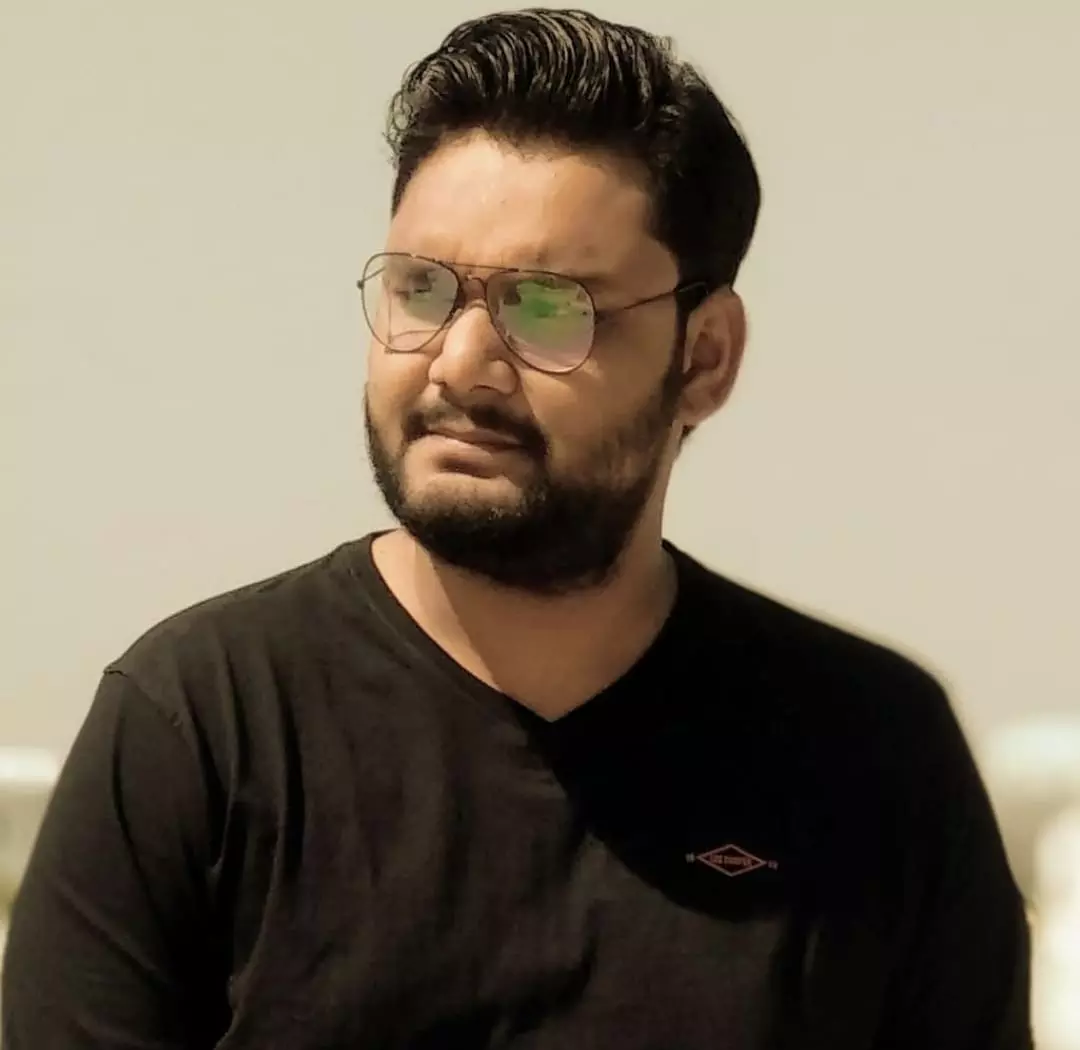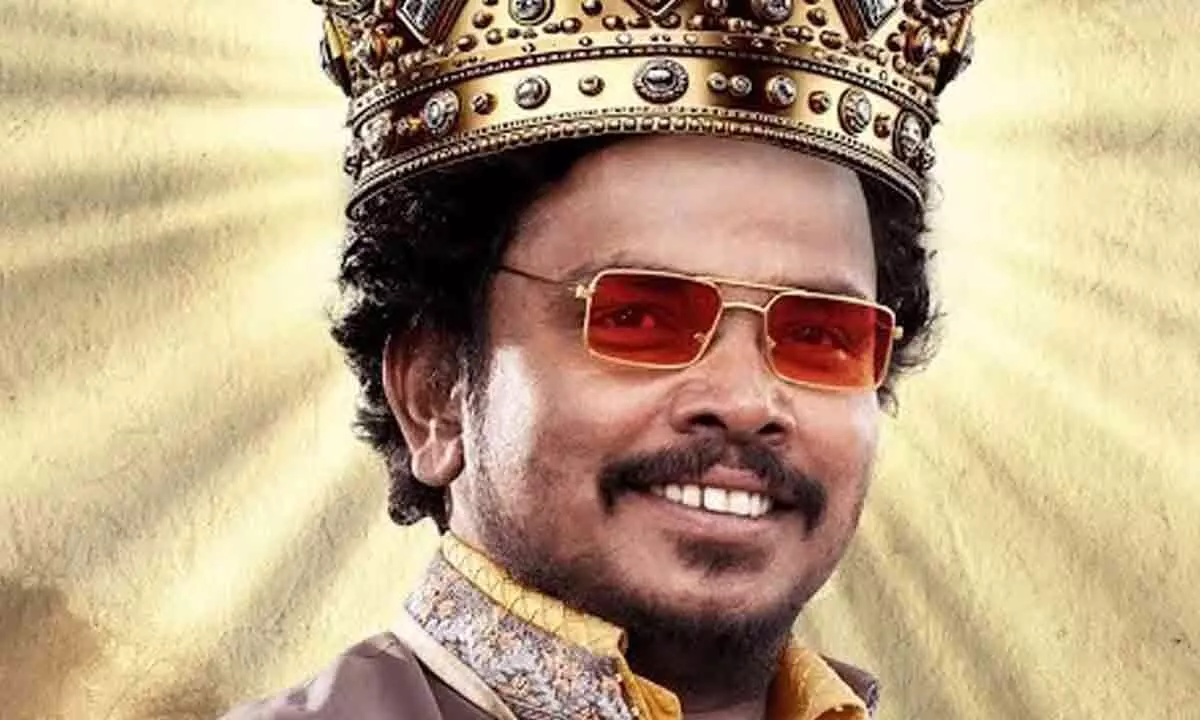Live
- 10 Tried-and-Tested Home Remedies for Toothaches
- Thila Taila Abhishekah Pooja to Lord Shaneswara
- Priyanka Gandhi says BJP talking of 'tinkering' with Constitution with PM’s nod
- LS polls: PM Modi says BJP-NDA leading 2-0 after first two phases
- Plea in Madras HC seeks special polling arrangement for names 'missing' from Coimbatore voter list
- Ex CM KCR Bus tour on 4 th day
- Youth National Games 2024 kick-start in Delhi; over 5,000 athletes from 15 states vying for top honours
- TN Police warn people against fraudsters using AI-based voice cloning
- L-G office blames Saurabh Bharadwaj for delay in enhancing MCD Commissioner's financial powers
- ICICI Bank posts 17 per cent rise in Q4 net profit at Rs 10,707cr; declares dividend of Rs 10 per share
Just In
‘Martin Luther King’ will be a laugh riot: Director Puja Kolluru


YNOT Studios and Reliance Entertainment proudly present ‘Martin Luther King’ which is hitting screens on October 27
YNOT Studios and Reliance Entertainment proudly present ‘Martin Luther King’ which is hitting screens on October 27. Produced by Mahayana Motion Pictures, the film is directed by Puja Kolluru. It features Sampoornesh Babu in the lead role while senior artistes VK Naresh and Sharanya Pradeep play key roles. The film's teaser, released recently, elicited an overwhelming positive response for its unique blend of political satire and entertainment, making it a refreshing addition to Telugu cinema.
Director Puja Kolluru, in a conversation with Hans India, shares about her experiences. Let’s have a look into it.
Can you please give a brief introduction about yourself?
I am a daughter of a Journalist who grew up in Vijayawada's Satyanarayanapuram. After studying up to 10th Class in Kendriya Vidyalaya, I was thinking about what to opt for because I was not a science student. There was no course that could cover both science and arts. After one year, I came to know about United World College of Mahindra. South African anti-apartheid activist and politician was honorary president of the institute. Education has been like movement for them for the last 50 years. The institute runs with this objective irrespective of caste, religion and region. It is located in Pune. When I applied, I was fortunate to get selected from 2,000 applicants. I was offered a Rs 25 lakhs scholarship. I was fortunate to study Physics, Economics, English literature, Spanish and one art subject, Film Studies.
During that time, I was so much influenced by filmmaker Guillermo del Toro who directed “Pan's Labyrinth.” He also directed “The Shape of Water” which was awarded The Oscars. So “Pan's Labyrinth” is a Spanish film that tells the Spanish Civil War from the perspective of a 10-year-old girl. I grew up watching “Aakali Rajyam” with my father and another late legendary director Viswanath's iconic films. Later, the storytelling and the way stories are being churned out are quite different.
Later to study my graduation, I applied to 4 universities in the USA. Although I secured a seat in all of them, Ringling College of Art and Design came forward offering me a scholarship of Rs 1.7 crore. I studied for four years, I had an amazing faculty who worked for some big Hollywood films. The team, who worked with 'American Beauty', taught me that was when I first learned about colours used in cinema. Later, I worked with Hollywood independent filmmakers. Hollywood studios work just like a corporate setup. But after coming to Tollywood, the atmosphere here is quite different. I worked with Swapna Dutt during the time of 'Mahanati'.
Having studied filmmaking in the USA, what made you choose a remake for the debut?
I've to tell a story. It doesn't matter whether it is a biopic or a remake. When I approached producers, they simply said it is a story that should be made after 5 years. I had already wasted a precious time of three years. When I got the offer, I felt it was the right script that I was looking for. I have many scripts with me. The themes like international integration. But Tollywood's functioning was different here. And the OTT too is a proxy to the cinema. They go by assumptions and statistics of what the audience actually wants. It was a culture shock for me watching all these here. So, usually, the stories I write can relate to Vijaywada and the USA. By looking at my appearance, people in the industry asked me to come with family dramas and romantic entertainers which are not my cup of tea.
Is it you who joined with Venkatesh Maha or did he join hands with you?
It was I who first collaborated with Venkatesh Maha. During the making of “Marmanu,” the crowd-funding film, I happened to hear the script and I was so thrilled. YNOT Studios Sashi approached Maha with the script for “Mandela.” They want to remake it. Maha politely turned down the offer as he has so many scripts in the pipeline. That's when I asked Maha if I am interested in taking up the project. The story may look like a political satire, but there is a personal angle and a discrimination angle to it. I grew up in a society where I had to face discrimination as a young girl. So, I told him that I can bring the depth into the story with all my personal experiences. I feel so proud to work with him.
Vijayawada is an epicentre of political activity. When you make a political satire, how your experiences with the society helped you in the script?
Society is not so ideal as we're taught in civics textbooks. You never find an ideal democratic nation in our society. Growing in Vijayawada, the socio-segregations that I have seen there, have all been included in the film. Maha has so much strength in writing screenplay and dialogues. Because he came from the people, he observed so closely. So, if I wrote them, it would have been quite different.
Is it your choice to cast a comedian like Sampoornesh Babu as the lead protagonist in the film?
No, it was totally Maha’s call. We had cast options of 64 artistes. Usually if we sit and discuss, we come to a conclusion about who would be the best cast for the principal character. It took 20 days to zero in on Sampoo. If it was other than Sampoo, only that actor is visible. But someone like a simple man, a common man like Sampoornesh Babu appears on the screen, it appears as though you brought a common man on the stage. That's his identity. Sampoornesh Babu is born for this role.
How welcoming is Tollywood for a female director like you?
It is very welcoming. If a woman filmmaker is coming to the industry, she has nothing to do with what the industry thinks about her. How determined she is important. There were problems in Hollywood too. Sexism has changed a lot in the film industry after the emergence of social media. There are two different generations.
The two Telugu States are undergoing a politically charged atmosphere due to elections. To what extent did you try to present the present political situation in ‘Martin Luther King’?
‘Mandela,’ the original Tamil flick reflects Tamil politics. Here, it is entirely different. Be it the pop culture references or from the cinema, we tried to show how people are leading their lives. Without political essence, the film can't be a satirical one. We haven't made the film to appease someone or mock somebody. If there is anything bias in the film it would be the bias that we have for the people, for the common man.
What are the major highlights of the film?
It's a complete fun and comedy entertainer. From a five-year-old girl dancing to folk music to the 80-year-old economic professor -- everyone would enjoy this laugh riot. This satire is not just for laughs. It will be embedded in the story. That is the highlight in terms of entertainment point of view. In terms of vote point of view, how important a vote is in a democracy already exists in the story. But we amped up very much. The King, the voter is the king you see the tagline, that is the punchline of the story. Martin Luther King had fought for civil rights --- especially against the discrimination of vote. I grew up listening to the name Martin Luther King. That's how I got connected with the name.
You didn't take the original music composer for the film. Why so?
Music changes everything, as I said we didn't want to make a remake, we want to make a film adaptation. One of the key elements is music. Smaran Sai is a young blood. He is not recognised much although after he did “RX100.” I loved Smaran Sai's work ethics. There are 5 songs in the film, you will never know whether they exist in the film. They just go with the flow.

© 2024 Hyderabad Media House Limited/The Hans India. All rights reserved. Powered by hocalwire.com






